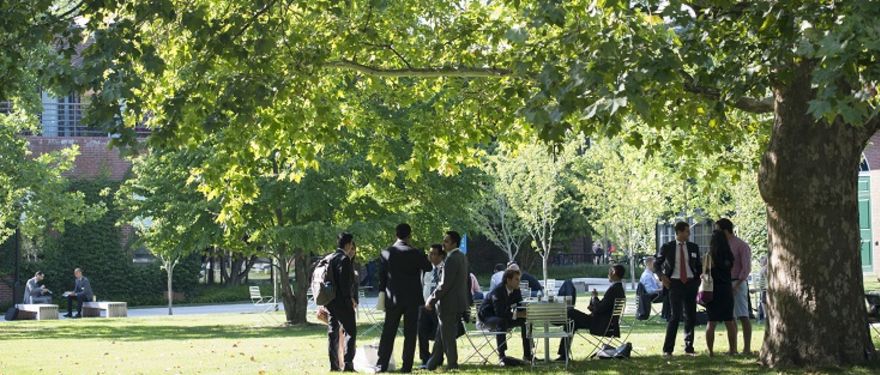Last August, when I was lugging cardboard boxes to the top
floor of Morris Hall, I 
had two expectations about my first year at HBS.
Firstly, I thought I was entering a holiday-like period where my school work would
take me two hours a day. Secondly, I thought I would never, ever work in
investment management.
Both of those expectations have turned out to be completely wrong. Now that I am entering my second year at HBS, I hope I can impart some of my knowledge and share what you can and can’t expect once you get here.
The Expected
When asked about HBS, one of the most-repeated words my friends use is “overwhelming”. I agree with this - you can expect your RC year to be very intense both from academic and social perspectives.
Firstly, the academic schedule is packed. The discussion group starts every day at 8:00am, so I would wake up at 6:30am, head for coffee at 7am at Spangler (our dining hall) and then reply to e-mails or prepare any remaining discussion group questions.
There are two to three 80 minute classes per day, finishing at 3pm. I underestimated how attentive you need to be in class. You can be cold-called at the beginning or in the middle of the class, and if you haven’t read the case, you feel like you’re letting your section down. 50% of your grade will be based on participation, so being engaged and making relevant, thoughtful remarks is very important.
It’s easy to underestimate the amount of work that needs to be put in to properly prepare two to three cases per day, each 10-60 pages in length. Not only do you have to read the case, but you also need to prepare answers for discussion group questions. In parallel, you will be working on your consulting project in an emerging market (as part of FIELD 2 in the first semester). The practical project work is almost certainly going to put you out of your comfort zone, adding to the intensity of the experience.
The rigor of the experience extends beyond academics – your social life will keep you plenty busy as well. With 900+ people in the first year class and 90 people in your section there are plenty of people to get-to-know and plenty of events to attend. I really appreciated the diversity of things to do - dinner with professors, section get-togethers (e.g., murder mystery dinner or charity evening), society drinks, outdoor activities, recruitment events, or hearing impressive accomplished people (e.g., Chelsea Clinton, Peter Thiel) speak.
In addition to all the above, many RCs opt for a leadership position in a student club or enter intensive internship recruitment periods. Personally, I organized the Technology Club’s New York Trek which involved scheduling a weekend trip for 150 people. I also did freelance projects for venture capital and private equity firms (which then helped me to gain an internship in venture capital). With all this activity, it’s especially important to build out time to reflect on your experience.
The Unexpected
The best parts of my first year at HBS, however, have been completely unexpected.
There are the small things: falling in love with Argentina, my FIELD 2 location; observing a classmate experience the most romantic proposal I’ve ever seen; seeing the hilarious HBS Show But there are also some larger, unexpected things that have changed either my character or perspective.
I am writing this blogpost from the office of a venture capital firm in Palo Alto. I have never been an investor and I have never lived in California. I would have never had the privilege to work in such an exciting environment if not for HBS. Harvard has allowed me to access such opportunities. As a result, I am much more likely to consider a career in investment than I was before school and I am considering staying in the Bay Area once I graduate.
I also gained a great deal of self-awareness at business school. In the first few months at school we completed a number of emotional intelligence exercises through FIELD 1. In addition, our discussion group provided each other with feedback on things like communication and leadership style.
The results of those both exercises were surprising, but clear: I need to work on my empathy. For example, one of my peers wrote, “Sometimes it seems as though you disengage once you have shared your answers and ideas.” Ouch. Since then, during my FIELD assignments, I have consistently worked to improve this trait. I trained myself to listen, to be patient and to engage more with other people’s thoughts.
This has doubtlessly helped me to become a better person, and a better leader, and it would not have happened if not for HBS.

